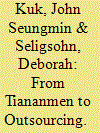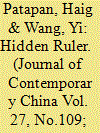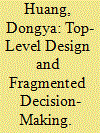|
|
|
Sort Order |
|
|
|
Items / Page
|
|
|
|
|
|
|
| Srl | Item |
| 1 |
ID:
169958


|
|
|
|
|
| Summary/Abstract |
This article analyzes China’s geopolitical maneuvers in the wake of the International Arbitral Court ruling over the South China Sea territorial disputes brought up by the Philippines. It finds that while the Philippines won the case in the sphere of international law, China won the geopolitical battle not only because the court does not have effective enforcement mechanisms but also because the international community lacked the will to induce significant compliance given China’s forceful rejection as a great power.
|
|
|
|
|
|
|
|
|
|
|
|
|
|
|
|
| 2 |
ID:
169965


|
|
|
|
|
| Summary/Abstract |
Mass media play an important role in grassroots democracy, yet the dynamics of media–citizen interaction remains under-researched. Using the case of the ‘Civil Monitory Organization’ (CMO) programme in Zhejiang’s Wenzhou city, this article shows how local media, and the local government to whom the local media are held accountable, shape citizen participation. This article develops the framework of ‘contingent participation’ to analyze the constraints on local political participation. Based on the observation of CMO activism, this article typologizes four participation behaviours: (1) symbolic participation; (2) instrumental participation; (3) managed participation; and (4) transgressive participation. This article concludes that contingent participation yields paradoxical results inherent under authoritarian rule: it aims to mobilize citizens to hold government accountable, yet denies the free flow of information and full participation of citizens.
|
|
|
|
|
|
|
|
|
|
|
|
|
|
|
|
| 3 |
ID:
169959


|
|
|
|
|
| Summary/Abstract |
A widely-held perception is that the image of North Korea among most Chinese people has changed from that of a socialist comrade and ‘little brother’ to an idiosyncratic, trouble-making neighbor. This research questions the homogeneity of Chinese people’s viewpoints towards North Korea. Concepts of state and popular nationalism are used to examine differences and similarities between the Chinese state and its people in their perceptions and sentiments towards North Korea, mainly focusing on the period of succession from Kim Jong-il to Kim Jong-un. Examining online discussions representing Chinese popular nationalism demonstrated that Chinese netizens’ political viewpoints are diversified along the ideological spectrum of left and right and that only the ‘moderate left’ netizens hold an image of North Korea which is close to that of their political authorities.
|
|
|
|
|
|
|
|
|
|
|
|
|
|
|
|
| 4 |
ID:
169964


|
|
|
|
|
| Summary/Abstract |
Mounting import competition from China has increased unemployment in manufacturing and suppressed wages in local labor markets around the United States. This article investigates the political effects of this China trade shock, using a unique dataset of the district-level economic impact of Chinese imports to the United States. The liberalization of trade following China’s accession to the World Trade Organization increased political polarization among American voters and encouraged legislators in economically hard-hit districts to take positions hostile to China. The result is that Congress is even more hostile towards China today than in the aftermath of the Tiananmen Massacre. After 2003, members of Congress who voted against China were more likely to come from districts that were adversely impacted by import competition, controlling for ideology and partisanship. By contrast, import competition was not a significant predictor of earlier congressional opposition to granting most-favored-nation status to China (suggesting that voting on these crucial pieces of legislation was driven by non-economic concerns such as human rights). Far from being the political win–win its proponents envisioned, trade has eclipsed human rights and Taiwan as the main driver of hostility to China in Congress.
|
|
|
|
|
|
|
|
|
|
|
|
|
|
|
|
| 5 |
ID:
169962


|
|
|
|
|
| Summary/Abstract |
Political selection in China has received increasing scholarly attention. Conventional measures of political promotion may suffer measurement error because of an (implicit) assumption that the chance of cadre promotion is constant across government and party units after controlling for their hierarchical rank. In this article, the validity of this assumption is tested. Based on the analysis of the biographical data of thousands of provincial bureau leaders, a strong agency effect is identified; leaders coming from politically important bureaus—defined by their connections to the Central Committee of the ruling party—stand a significantly higher chance of promotion than those coming from the less important ones. Incorporating the agency effect, the authors develop a continuous measure of political turnover. Using this refined measure, the authors revisit the effect of economic performance on provincial cadre promotion. While a positive relationship is found, the effect is arguably too small to be substantively significant.
|
|
|
|
|
|
|
|
|
|
|
|
|
|
|
|
| 6 |
ID:
169961


|
|
|
|
|
| Summary/Abstract |
The article provides the first comprehensive examination of the life and thought of Wang Huning, member of the Politburo, advisor to three Chinese leaders and important contributor to major political conceptual formulations in contemporary China. In doing so, it seeks to derive insights into the role of intellectuals in China, and what this says about Chinese politics. It argues that, although initially reluctant to enter politics, Wang has become in effect a ‘hidden leader’, exercising far-reaching influence on the nature of Chinese politics, thereby revealing the fundamental tensions in contemporary Chinese politics, shaped by major political debates concerning stability, economic growth and legitimacy.
|
|
|
|
|
|
|
|
|
|
|
|
|
|
|
|
| 7 |
ID:
169963


|
|
|
|
|
| Summary/Abstract |
This study tries to determine to what extent the Chinese bureaucracy is merit-based. By triangulating quantitative and qualitative survey data from a sample of Chinese cadres (n=286), the authors aim to answer the research question: ‘What is the behavioral impact of the incentive structure the cadre management system helps to shape, and does the incentive matrix support a meritocratic work environment?’. The findings demonstrate that the promotion of local leading cadres is primarily based on their superiors’ recognition and appreciation. A principal-component analysis reveals that what impresses the superiors includes both patronage and merit factors, although patronage has a slight edge over merit. This study also suggests that good interpersonal skills are essential for both merit- and patronage-oriented career advancement.
|
|
|
|
|
|
|
|
|
|
|
|
|
|
|
|
| 8 |
ID:
169960


|
|
|
|
|
| Summary/Abstract |
This article sheds light on the nature, forms and outcomes of China’s diplomacy over transboundary water resources. Water diplomacy bears unique and complex features and approaches for forming cooperative partnerships in the contextual settings where it is developed. By surveying the development and effectiveness of water diplomacy, it argues that water diplomacy is unlikely to succeed in conditions where power relations are unstable, or among countries experiencing low economic growth.
|
|
|
|
|
|
|
|
|
|
|
|
|
|
|
|
| 9 |
ID:
169966


|
|
|
|
|
| Summary/Abstract |
As of 2005, the mainland Chinese government has implemented ‘favor-granting policies’, the purpose of which is to offer economic benefits in exchange for Taiwanese people’s recognition of their political identity. In 2015, this strategy reached its 10th anniversary. Questions that arise are whether such recognition has increased significantly among Taiwanese people during this time, and what factors have influenced Taiwanese people’s regime acceptance of mainland China. In order to address these questions, this study analyzed data from the ‘Taiwan National Security Studies Surveys’ on the basis of social identity, rational choice, social contact and political socialization theories. The findings indicate that the level of regime acceptance of Taiwanese people towards mainland China averaged 3.77 (standard deviation of 2.46) in 2005, and 3.95 (2.22) in 2015, reflecting an increase of 0.18. This study reveals five factors that influence Taiwanese people’s regime acceptance of mainland China, namely ethnic identity, going to China for employment, experiences of going to China, sentiments on peace and war, and party identification. The regression model constructed in this study can explain 26.26% of the variance in Taiwanese people’s regime acceptance level.
|
|
|
|
|
|
|
|
|
|
|
|
|
|
|
|
| 10 |
ID:
169967


|
|
|
|
|
| Summary/Abstract |
State-owned enterprise (SOE) reforms have typically been considered the result of bargaining under China’s fragmented bureaucratic structure. This study uses the case of the CNR–CSR merger to investigate the latent changes that have recently occurred in the policy-making structure of SOE reforms. This study will demonstrate that ‘top-level design’—in the context of a strengthened political authority and centralised political power—dominates SOE reforms and changes the pattern of fragmented interest bargaining among government departments and SOEs. In this context, the national strategy can be implemented with little resistance, contradicting scholarly predictions of fragmented authoritarianism. However, the top-level design does not appear to be based on a rational decision-making process; rather, its goals are vague, and the methods for achieving them have not been debated rationally. The policy-making process in this case study involved figuring out the top-level leaders’ intentions and rationalising the decisions afterwards. A top-level design with weak rationality may have risky consequences.
|
|
|
|
|
|
|
|
|
|
|
|
|
|
|
|
|
|
|
|
|